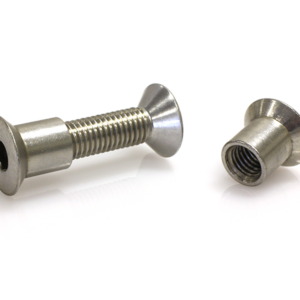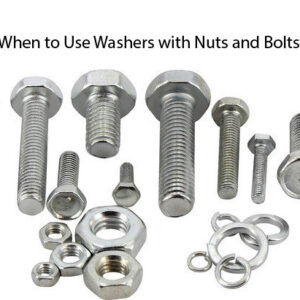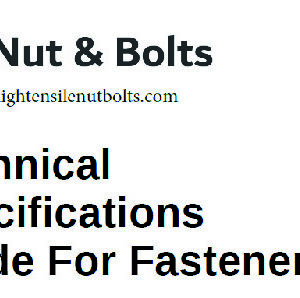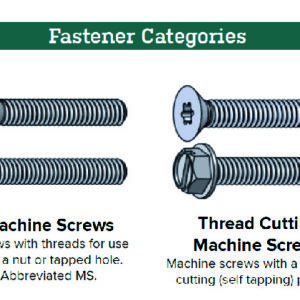When it comes to woodworking, many people instinctively reach for nails or wood screws to join their pieces together. However, there’s a better option in many cases: through-bolts. These bolts provide superior strength and stability in connecting wood.
A through-bolt is a type of bolt that goes all the way through the wood and is secured with a nut on the other side, creating a “sandwich” connection. When choosing and using fasteners for woodworking projects, there are several factors to consider.
The Challenge of Wood Shrinkage
One major challenge when fastening wood is the natural shrinkage that occurs over time. As wood dries out and contracts, even a tightly fastened screw can become loose and unstable. While retightening screws or lag bolts can help, using a through-bolt is a foolproof way to secure the connection.
For instance, when attaching handrail posts or safety supports to a newly built deck or any structure, it’s common for DIY enthusiasts to underestimate the extent of wood shrinkage that can happen. In these cases, they often opt for lag bolts, which is a mistake. Shrinkage can cause the bolt hole to strip out, necessitating the use of a larger lag bolt or screw.
When there’s a possibility of shrinkage — which is almost always the case when working with green wood — it’s recommended to use a through-bolt. With a bolt-head and washer on one side and a nut and washer on the other, adjusting the connection after some shrinkage is a simple task. Of course, there are situations where using a through-bolt is not feasible because access to the other side is limited. In those instances, through-bolts may not be suitable.
By considering through-bolts as an option, you can ensure stronger and more stable woodworking connections in your projects.
Choosing the Right Bolt Grade for Your Project
When it comes to bolts, it’s important to consider their grade. Nuts and bolts can vary greatly in strength, ranging from very soft to extremely high tensile strength.
In the past, asking for an A-grade bolt would ensure a strong and durable option that could withstand a lot of force. However, nowadays, there are numerous grades and specifications available, making the selection process more complex.
If you’re working on a project that requires a guard rail or any other safety device, it’s crucial to research the appropriate bolt grade before making a purchase. Simply ask a store clerk for higher grade fasteners, as most hardware stores and home centers have a dedicated section for better-quality connectors.
Sadly, many consumers are unaware of the different grades available and therefore don’t know to inquire about them. If you opt for high tensile strength, be prepared for a limited selection. These nuts and bolts are more expensive and not typically stocked in the wide range of sizes provided for softer and cheaper connectors.
It’s common for us to use bolts that are too small in diameter for the task at hand. However, it’s important to remember that increasing the diameter of a bolt also increases its holding power. Conversely, smaller diameters result in decreased holding power. For instance, engineers often recommend using two half-inch through-bolts to ensure proper strength for a rail post to meet building code requirements as a handrail support. Yet, we frequently encounter homemade rail systems that utilize three-eighths inch or even quarter-inch bolts.
While these smaller diameter bolts may initially seem secure and visually appealing, they are inadequate in preventing the rail from collapsing if someone leans on it. This outcome is undesirable for the purpose of a guard or handrail.
By selecting the appropriate bolt grade and diameter, you can ensure the strength and durability needed for your project, especially when it comes to safety-critical elements like railings.
Choosing the Right Washers for Your Bolts
When it comes to fastening bolts, whether through-bolts or lag bolts, it’s important to consider the use of washers. Washers contribute to the holding power of the bolts, and the bigger the washer, the better the holding power.
For instance, if you’re building a wood deck rail, using through-bolts with washers at both ends is highly recommended. When working with soft woods commonly used for decks, we suggest using “fender” washers. Fender washers have the same size hole in the middle but are larger in diameter on the outside. Though slightly more expensive, fender washers provide significantly better holding power.
In addition to washers, using a lock washer further enhances bolt stability. There are different types of lock washers available, and any kind is better than none at all.
However, an even better option is a lock nut. Lock nuts offer superior holding power, can be easily tightened, and are less prone to twisting off compared to some lock washers. These nuts have plastic in the center that securely grips the bolt threads as it is tightened. All you need to do is ask for a “lock nut.”
By choosing the right washers and nuts for your bolts, you can ensure maximum holding power and reliability in your constructions.
5 Essential Tips for Buying Fasteners
If you’re on the lookout to purchase fasteners, here are five things you should keep in mind:
- Whenever possible, opt for a through-bolt.
- Go for high tensile strength nut and bolts.
- On wood projects, use washers without fail. For wood decks, we recommend fender washers.
- For maximum bolt stability, use either a lock washer or a lock nut. We suggest a lock nut, but it’s your choice.
- After a few months, check and tighten loose connections. Wood drying and shrinking cause such connections over time.
By following these tips, you can ensure that your fasteners provide the right level of durability and strength for your construction work, and that it remains secure for longer.




